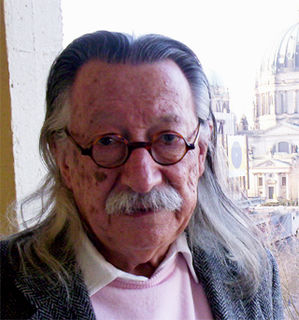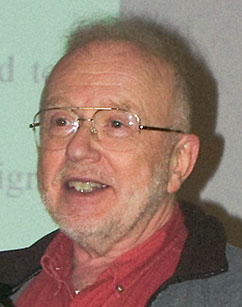The Association for Computing Machinery (ACM) is an international learned society for computing. It was founded in 1947, and is the world's largest scientific and educational computing society. The ACM is a non-profit professional membership group, claiming nearly 100,000 student and professional members as of 2019. Its headquarters are in New York City.

Joseph Weizenbaum was a German American computer scientist and a professor at MIT. The Weizenbaum Award is named after him. He is considered one of the fathers of modern artificial intelligence.

Norbert Wiener was an American mathematician and philosopher. He was a professor of mathematics at the Massachusetts Institute of Technology (MIT). A child prodigy, Wiener later became an early researcher in stochastic and mathematical noise processes, contributing work relevant to electronic engineering, electronic communication, and control systems.

Kristen Nygaard was a Norwegian computer scientist, programming language pioneer, and politician. Internationally Nygaard is acknowledged as the co-inventor of object-oriented programming and the programming language Simula with Ole-Johan Dahl in the 1960s. Nygaard and Dahl received the 2001 A. M. Turing Award for their contribution to computer science.

David Lorge Parnas is a Canadian early pioneer of software engineering, who developed the concept of information hiding in modular programming, which is an important element of object-oriented programming today. He is also noted for his advocacy of precise documentation.
Computer Professionals for Social Responsibility (CPSR) was a global organization promoting the responsible use of computer technology. CPSR was incorporated in 1983 following discussions and organizing that began in 1981. It educated policymakers and the public on a wide range of issues. CPSR incubated numerous projects such as Privaterra, the Public Sphere Project, the Electronic Privacy Information Center, the 21st Century Project, the Civil Society Project, and the Computers, Freedom and Privacy Conference. Founded by U.S. computer scientists at Stanford University and Xerox PARC, CPSR had members in over 30 countries on six continents. CPSR was a non-profit 501.c.3 organization registered in California.
The Norbert Wiener Prize in Applied Mathematics is a $5000 prize awarded, every three years, for an outstanding contribution to "applied mathematics in the highest and broadest sense." It was endowed in 1967 in honor of Norbert Wiener by MIT's mathematics department and is provided jointly by the American Mathematical Society and Society for Industrial and Applied Mathematics.
Computer ethics is a part of practical philosophy concerned with how computing professionals should make decisions regarding professional and social conduct. Margaret Anne Pierce, a professor in the Department of Mathematics and Computers at Georgia Southern University has categorized the ethical decisions related to computer technology and usage into three primary influences:
- The individual's own personal code.
- Any informal code of ethical conduct that exists in the work place.
- Exposure to formal codes of ethics.

The IEEE Communications Society (ComSoc) promotes the advancement of science, technology and applications in communications and related disciplines. It fosters presentation and exchange of information among its members and the technical community throughout the world. The Society maintains a high standard of professionalism and technical competency. The IEEE Communications Society is a professional society of the IEEE.
The IEEE Society on Social Implications of Technology (SSIT) is a professional society of the Institute of Electrical and Electronics Engineers (IEEE). The society's Field of Interest is, according to its constitution;
David Leigh Donoho is a professor of statistics at Stanford University, where he is also the Anne T. and Robert M. Bass Professor in the Humanities and Sciences. His work includes the development of effective methods for the construction of low-dimensional representations for high-dimensional data problems, developments of wavelets for denoising and compressed sensing. He was elected a Member of the American Philosophical Society in 2019.

The Information: A History, a Theory, a Flood is a book by science history writer James Gleick published in March 2011 which covers the genesis of our current information age. It was on The New York Times best-seller list for three weeks following its debut.

The Gesellschaft für Informatik is a German organization of approximately 20,000 computer science educators, researchers, and professionals as well as about 200 corporate members. It is the biggest organized representation of its kind in the German-speaking world.
The Weizenbaum Award was established in 2008 by the International Society for Ethics and Information Technology (INSEIT). It is given every two years by INSEIT's adjudication committee to an individual who has “made a significant contribution to the field of information and computer ethics, through his or her research, service, and vision.”
Gary Chapman was the first executive director of Computer Professionals for Social Responsibility (CPSR).
This article gives an overview of professional ethics as applied to computer programming and software development, in particular the ethical guidelines that developers are expected to follow and apply when writing programming code, and when they are part of a programmer-customer or employee-employer relationship. These rules shape and differentiate good practices and attitudes from the wrong ones when creating software or when making decisions on a crucial or delicate issue regarding a programming project. They are also the basis for ethical decision-making skills in the conduct of professional work.
Marsha J. Berger is an American computer scientist. Her areas of research include numerical analysis, computational fluid dynamics, and high-performance parallel computing. She is a Silver Professor of Computer Science and Mathematics in the Courant Institute of Mathematical Sciences of New York University.

Fei-Yue Wang is a Specially Appointed State Expert, and The Chief Scientist and Founding Director of the State Key Laboratory for Management and Control of Complex Systems of the Chinese Academy of Sciences and editor-in-chief of the IEEE Transactions on Computational Social Systems and the IEEE/CAA Journal of Automatica Sinica. Previously he was a Professor of Systems and Industrial Engineering at the University of Arizona, president of the IEEE Intelligent Transportation Systems Society,editor-in-chief of IEEE Transactions on Intelligent Transportation Systems (2009-2016) and editor-in-chief of IEEE Intelligent Systems.